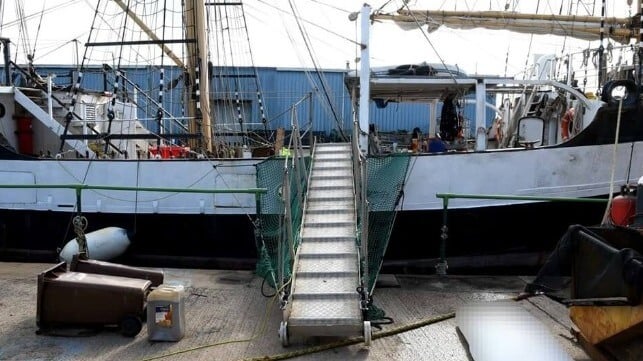MAIB: Cook Had 18 Shots of Whiskey Before Fatal Gangway Accident

Heavy drinking and a poorly-rigged gangway led to the death of a crewmember aboard the tall ship Pelican of London last year, according to a new after-accident report from the UK Marine Accident Investigation Branch.
In late September 2023, the Pelican of London pulled into Bristol's Sharpness shipyard for a drydocking period. The ship's cook departed for training and shore leave, and on September 28, a volunteer joined the ship to provide relief coverage. The relief cook - a 64-year-old professional seafarer - joined his shipmates at a local bar after hours several times. Other crewmembers observed that he drank several double whiskies per night on Sept. 30 and October 1.
On October 2, his fifth night aboard, the relief cook joined shipmates at the bar again. MAIB determined that he had at least nine double whiskies (18 shots) in less than three hours, and he was the last person to leave the bar at about 2250 hours that night.
The relief cook walked back to the ship alone, arriving at 2307. CCTV footage showed him coming up the gangway and then stepping over onto the bulwark ladder to descend onto the main deck. Before he could board, however, he toppled off the top of the aft side of the gangway and into the flooded dock. The chief engineer heard the noise and ran up on deck, arriving within seven seconds. He heard a noise under the gangway but saw nothing, so he went back to bed, unaware that the relief cook had gone over the side. The cook's absence was only noticed at breakfast the next morning, and after a review of the port's CCTV footage, the police were called to search the dock.
The body was retrieved from the water at about 1400 hours, and postmortem testing found a blood alcohol content of 0.19% - roughly equivalent to eight beers for an average male. MAIB concluded that he likely experienced cold water shock and swim failure, and rapidly drowned after entering the water.
Inspectors found that the guard rope between the gangway stanchion and the main deck was weighed down by an electrical cable, leaving a large gap. The safety net below was rigged to slope away from the gangway, creating a "chute" towards the water. There was no gangway watch posted, nor were there any written procedures for rigging the gangway. (When asked, many crewmembers said that the net was there to catch any parcels dropped while using the gangway - not to save personnel.)
"The inadequate fencing and inappropriately rigged safety net exposed all gangway users to serious hazard as they traversed the gangway," concluded MAIB. "Having rigged the gangway as it was normally rigged, poor practice was passed on over time without question and without a true understanding of the purpose of either the guard ropes or the safety net."
Pelican of London had an SMS manual, and it advised crewmembers that alcohol "should be enjoyed in moderation" and recommended "not to drink for several hours prior to a duty period." The relief cook had had so much to drink that he would probably have been at nearly twice the legal blood-alcohol limit by 0730 the next morning, when he was expected to start duty.
"The policies did not provide crew and trainees with clear guidance on drug and alcohol consumption while ashore nor how others might intervene effectively," found MAIB. "There were early indications of a problem with the relief cook’s alcohol consumption, but this did not result in an effective intervention."
On MAIB's recommendation, the vessel operator undertook extensive changes to its drug and alcohol policy, briefing materials, rigging standards and emergency-response protocols.
